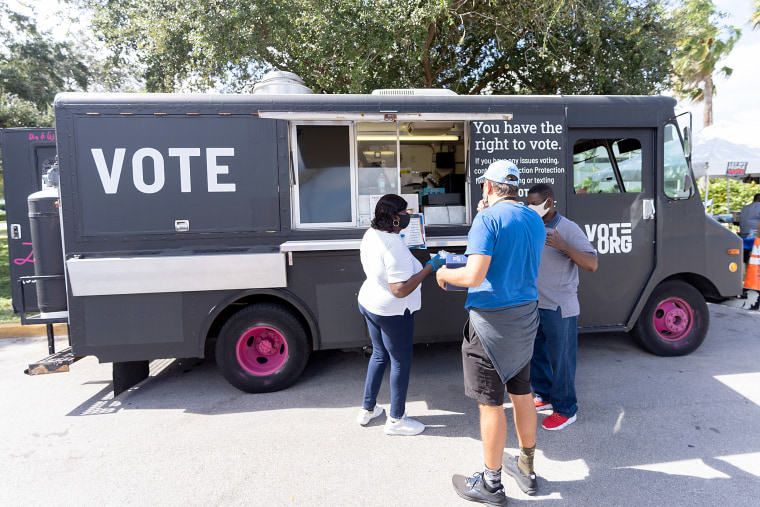MIAMI — Voting rights organizations and progressive groups filed a lawsuit late Monday night to block an election law in the battleground state of Florida, alleging that it discriminates against Latino and Black voters and amounts to voter suppression.
“SB 90 is an anti-democracy, anti-voter bill that makes it harder to vote by mail, criminalizes line warming activities, and further limits voter assistance at the polls,” said Judith Browne Dianis, executive director of the Advancement Project National Office, one of the organizations that filed the suit. “Florida is a state with a long history of discriminating against voters based on race.”
The groups held a virtual news conference Tuesday morning to announce the lawsuit.
Gov. Ron DeSantis, a Republican, signed the bill, SB 90, into law in early May at a closed-door event, blocking all reporters and media coverage except for Fox News. He said the new voting rules are designed to boost election security.
The law puts an end to 24/7 ballot drop boxes and requires that they be monitored in-person by an election official. Ballots can only be accepted during early voting hours. Those who would like to vote by mail will have to request a ballot each year instead of every two. Only election workers can provide assistance, like distributing food and beverages, within 150 feet of polls or drop boxes.
“By having an 150-feet requirement for individuals providing assistance, you're essentially denying individuals the opportunity to have an assistance of their choice because the people have to stand far away outside of the polls,” said Jorge Vasquez, program director at the Advancement Project. “It's clear that Gov. DeSantis doesn't like Black or brown voters. It's clear that as Florida continues to become diverse, that voters of color are once again under attack.”
The law also requires that those who request mail-in ballots or change party affiliation provide either a Florida driver’s license number, state identification number or the last four digits of their social security number.
Voting rights advocates say voters may not have access to those numbers when they make the vote-by-mail request. They may not have a driver’s license or are not willing to share social security number.
Kira Romero-Craft, an attorney with LatinoJustice PRLDEF, said there's a fair number of voters who designate someone to pick up a vote-by-mail ballot for them within the nine-day period prior to Election Day. Under the new law, that person would be required to have the other person's last four digits of their social security number, Florida identification number or driver's license number, causing privacy issues.
"It creates an unnecessary obstacle, and it can cause them to drop their vote-by-mail request altogether," said Romero-Craft.
In 2016 and 2018, slightly more Republicans than Democrats voted by mail in Florida, while in 2020 almost 1 million more Democrats than Republicans voted by mail.
The Republican-sponsored bill passed in late April mostly along party lines in both chambers: 77-40 in the House, and 23-17 in the Senate.
Florida Republicans say the law was necessary to make elections more secure, though they have also pointed to Florida’s smooth election last November.
But the new law is in line with GOP efforts to reshape electoral laws even in states like Florida, where former President Donald Trump and other Republican candidates won. Republicans made significant gains last year among Latinos in Florida, where Trump won about 47 percent of the Latino vote. The majority of Latino and Black voters in the state still voted for Biden.
Trump’s false claims of widespread voter fraud in the 2020 election have been embraced by his base. Georgia also passed a law recently restricting its state election process, while Arizona, Texas and other Republican-led states have pursued similar measures placing limits on accessing ballots.
The lawsuit was filed Monday by the Advancement Project National Office, Demos and LatinoJustice PRLDEF on behalf of Florida Rising, Faith in Florida, the Equal Ground Education Fund, UnidosUS, the Hispanic Federation and Poder Latinx.
Follow NBC Latino on Facebook, Twitter and Instagram.

